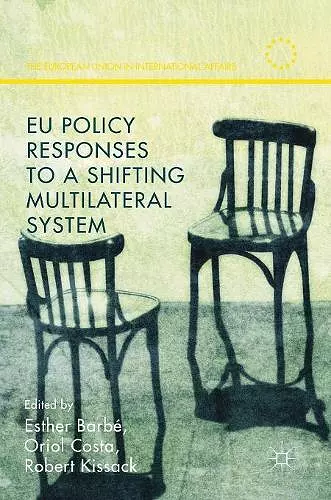EU Policy Responses to a Shifting Multilateral System
Esther Barbé editor Oriol Costa editor Robert Kissack editor
Format:Hardback
Publisher:Palgrave Macmillan
Published:6th Oct '16
Should be back in stock very soon
This hardback is available in another edition too:
- Paperback£59.99(9781349714452)

"Analyzing the EU's reaction to global structural change across a range of multilateral policy domains, this volume is analytically novel, empirically rich, and unusually cohesive. The findings will be of interest not only to observers of the EU's external relations but also to those seeking insights on the role of power, ideas and institutions on multilateralism more generally." (Professor Katie Verlin Laatikainen, Adelphi University, New York, USA) "By exploring how the EU has responded to the changing global balance of power this book adopts a refreshing outside-in approach to EU foreign policy. The case studies yield valuable insights, but the volume's most singular contribution is to launch a vital research agenda, which should engage scholars of the EU as a global actor for years, if not decades, to come." (Professor Alasdair Young, Georgia Tech, USA) "How has the EU responded to challenges to the ideas underlying various multilateral institutions, the distribution of power within them, and their design and rules? Contributors to this innovative book find that the EU either accommodates or resists challenges to the existing order. A ground-breaking addition to the literature on the changing international system and the EU's role within it." (Professor Karen E. Smith, London School of Economics, UK)
This book explores how the EU, as an international actor, is adapting to recent transformations in the multilateral system.
This book explores how the EU, as an international actor, is adapting to recent transformations in the multilateral system. The international identity of the European Union is built upon its support for effective multilateralism and its commitment to core norms and values. Until recently, there was no need to choose between these goals. Emerging powers in the international system are not only demanding more power in multilateral institutions, but also sometimes seeking to influence their purpose and function, away from those championed by the EU. This presents a dilemma for EU foreign policy – framed in this edited volume as either accommodating changes in order to support multilateral institutions or entrenching the EU position in order to uphold values. Using a common analytical framework, the chapters include case studies on important multilateral institutions such as the United Nations Security Council, the International Monetary Fund, the World Trade Organization and the International Criminal Court, as well as key policy areas such as energy, climate change, nuclear non-proliferation, and human rights.
“This book edited by three Professors of International Relations at IBEI … is definitely useful to understand topical trends in international politics, such as the intensification of contradictions between the transnational and the national or between the economy and the political. … This non-Eurocentric perspective brought by non-Anglo-Saxon researchers is very welcomed. The specific approach taken by the authors is actually the main contribution of the book within the literature on European foreign policy.” (Marlène Rosano-Grange, European Review of International Studies, Vol. 05 (01), 2018)
ISBN: 9781137547576
Dimensions: unknown
Weight: unknown
246 pages
2016 ed.